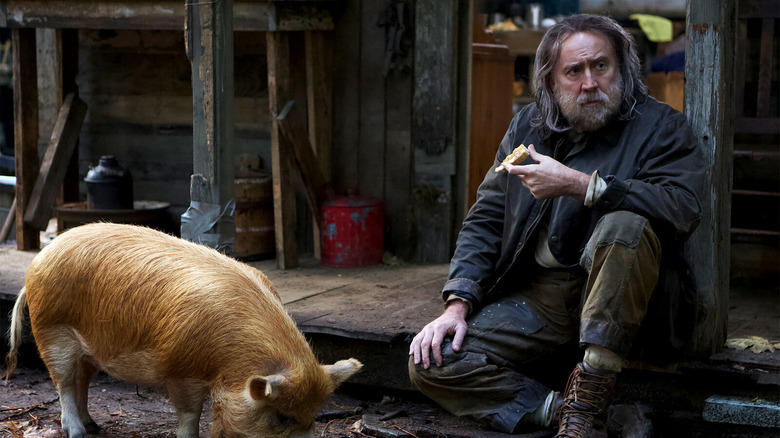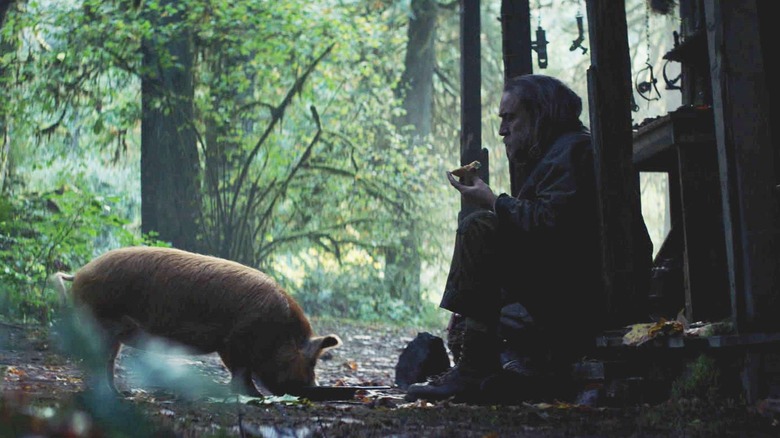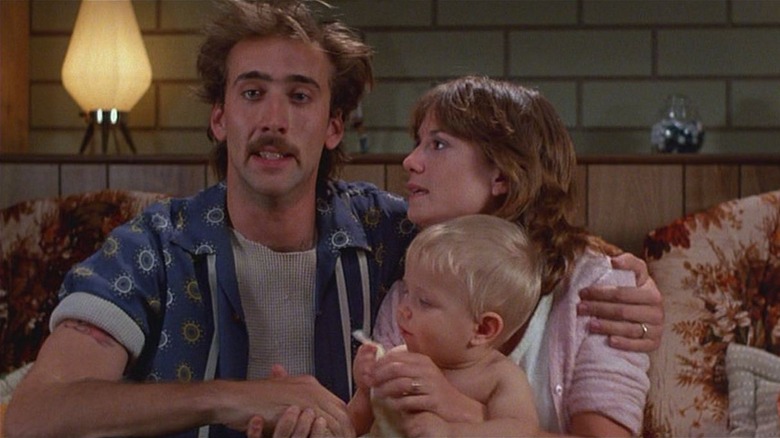In Michael Samoski’s 2021 drama “Pig,” Nicolas Cage plays a quiet, bearded recluse named Rob Feld who lives in a remote woodland cabin with his unnamed pet pig. The pig is a skilled truffle forager, and Rob makes a living selling truffles to a restaurant supplier (Alex Wolff) who occasionally drives out to his cabin. Rob clearly has a dark past, but has seemingly found peace in the woods. One night, however, Rob is attacked, and his pig is stolen. Rob has to trek into nearby Portland to retrieve his animal friend, and, we learn, confront his past.
As the film progresses, we discover that Rob had unusual connections in the world of Portland’s high-end restaurateurs, and that he participated in eatery-related underground fighting rings (!). He’s also still in mourning over the death of his wife years before, which was the primary impetus driving Rob to become a recluse. More than anything, though, Rob just wants his pig back — not just for the truffles, but because she has become a valued companion.
“Pig” was highly praised when it was released, and it received numerous awards from many prestigious critical bodies. On an episode of “The Late Show with Steven Colbert,” Nicolas Cage announced that it was his favorite of his own movies, along with “Mandy,” “Bringing Out the Dead,” “Joe,” and “Bad Lieutenant: Port of Call, New Orleans.” (Curiously, Cage didn’t list “Leaving Las Vegas,” the 1995 alcoholism drama that won him an Academy Award.)
Of all of Cage’s films, “Pig” also earned the second most positive notices. On Rotten Tomatoes, “Pig” has a 97% approval rating based on 275 reviews. Only his 1993 neo-noir “Red Rock West” has a higher rating at 98% (based on 41 reviews).
Pig contains some of Cage’s best work
Cage, it seems, likes to work with notable, experienced directors. Of the films he rattled off to Colbert, one was directed by Martin Scorsese, one by Werner Herzog, and one by David Gordon Green. “Mandy” was an outlier in that its director, Panos Cosmatos, had only made one film prior called “Beyond the Black Rainbow.” “Pig” was even more of an outlier as filmmaker Michael Sarnoski had only previously made a single documentary short called “The Testament,” about the Minova Trial in the Congo. “Pig” was his first scripted feature. Cage must have had a lot of faith in Sarnoski, as he brought his A-game.
Not that Cage ever sleepwalks through a movie — he’s typically devoted to his characters, whether appearing in low-budget indie dramas or high-profile Hollywood genre flicks. Cage is frequently accused of being maniacal on screen, and has earned a reputation for being something of a ham. The actor is aware of his reputation, though, and often defends his performance style, knowing that he merely plays maniacal people from time to time. The actor even riffed on his own image in the film “The Unbearable Weight of Massive Talent,” in which he played an exaggerated version of himself. But as often as Cage plays weirdos and maniacs, he plays understated, quiet characters, frequently giving soulful and subtle performances.
“Pig” is one of the latter. For much of the film, Cage’s character is silent and withdrawn, living within inner shadows the audience cannot initially see. At the beginning of “Pig,” we see a man at peace, but it is a hard-earned peace, constructed hastily on top of a cracked foundation. There is so much hurt in Cage’s stare, and so much comfort when he is with his pig. It really is one of his best performances.
Cage’s other highest rated hits on Rotten Tomatoes
Nicolas Cage has appeared in dozens of highly acclaimed movies, and works with many daring, original directors. He’s played heroes, villains, and everything in between. Indeed, one of his hero roles can be seen in another 97%-approved film, the popular “Spider-Man: Into the Spider-Verse.” In that movie, Cage played a film noir version of Spider-Man from an alternate universe. And although it’s absurd, John Woo’s overblown 1997 actioner “Face/Off” was also ranked highly by critics, and the film sports a 91% approval rating. In that film, Cage swaps faces with John Travolta, and the two actors effectively get to play each other.
Four of Cage’s film sport 91% approval ratings, and they couldn’t be more different from one another. Critics enjoyed his recent surrealist comedy “Dream Scenario,” while also heaping praised on the depressive and tragic “Leaving Las Vegas.” Of course, his performance in the quirky 1987 Coen Bros. crime comedy “Raising Arizona” is still deeply beloved to this day, and many critics were fond of Cage’s rendition of Superman in “Teen Titans GO! To the Movies.”
Of course, not all of Cage’s films are well-received. Indeed, his 2014 Biblical drama “Left Behind” sports an unenviable 0% approval rating, and many audiences were baffled as to why Cage would have made a straight-up Christian movie. Also hefting around a 0% is the 1993 neo-noir “Deadfall,” a miserable film with an impressive cast: Michael Biehn leads an ensemble that includes Cage, James Coburn, and Peter Fonda. Christopher Coppola directed, so Cage likely appeared as a brotherly favor (Cage is, it should be noted, the nephew of “Megalopolis” director Francis Ford Coppola). Cage, only 60 years old, continues to work constantly, and always turns out interesting performances. May we be blessed with at least a few more decades of his cinematic presence.





